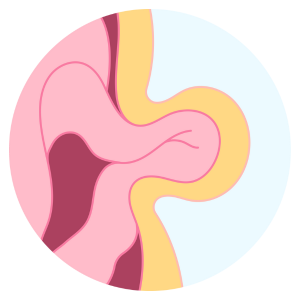
What is a hernia?
A hernia is caused when an internal part of your body pushes through a weakness in your muscle wall.
Hernia normally develops in the abdomen or groin and is noticeable when a small swelling or lump appears in these areas. In many cases, there are very little, or sometimes no symptoms at all, however there is a high possibility that it will enlarge in size and give rise to symptoms such as pain and discomfort. Rarely it can trap its contents (bowel) thus becoming a surgical emergency. It is therefore always recommended to get seen by an expert as soon as possible.
Other symptoms to be aware of are:
– Worsening pains
– Difficulty with bowel movements
– Nausea which can lead to vomiting
What types of hernia are there?
Hernias can be external that can be seen on your body in the form of a lump or internal hernias which are not visible.
Best advice is to seek specialist advice. This can result in proper clinical assessment and then further investigations or treatment can be recommended.
Inguinal hernia
This type can occur at any age but is mostly associated with getting older. Your body naturally gets weaker which means muscles and tissues become weaker. Inguinal hernias are caused when part of your bowel or fatty tissue pushes through a weak area in your groin and forms a lump. Another similar hernia is Femoral hernias which are less common than Inguinal hernias and occur more for women than men.
At KIMS Hospital, we offer an Inguinal hernia repair treatment. Click here to find out more information and book a consultation.
Umbilical hernia

Umbilical hernia can also occur when fatty tissue or part of the bowel, however this pushes through a weakness in the tummy, near the belly button.
This type can commonly occur in infants, particularly premature babies, however it can also occur in some adults.
At KIMS Hospital, we offer the treatment of Umbilical hernia repair. Surgery is usually recommended for these types of hernia as complications can develop.
Hiatus hernia
This a common type of internal hernia where in the stomach migrates into the chest.
It can cause symptoms of acid reflux or upper abdominal discomfort pain. It needs further investigations for assessment and surgical treatment if particularly large or causes severe symptoms.
Other types include:
– Incisional hernia
– Epigastric hernias
– Spigelian hernias
– Diaphragmatic hernias
– Muscle hernias
If you are concerned about any of the above hernias or experiencing any symptoms, please make an enquire today with our expert team and we can guide you to the best service and treatments.
How to treat?
If you are experiencing any symptoms or have any concerns, the first point of call would be to get reviewed by an expert. Once identified, your Consultant will advise you and refer you for the best treatment. Not every case will result in surgery. Even though hernias without treatment cannot get better, this does not mean that the problem will get worse.
If you would like to discuss your symptoms by our General Surgery Consultants, please click here to book an appointment.